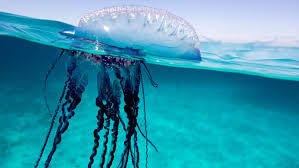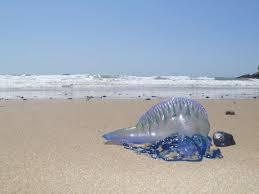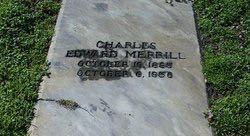Palm Beach Elegy
Humanity must perforce prey on itself
Like monsters of the deep.
—Shakespeare, King Lear
"Monsters of the deep" inhabit all three poems featured on the "Under Pisces" website, but rather than preying upon humanity they represent the suffering humanity inflicts upon itself. Scenes of sharks, poisonous Man-of-Wars, and the frightening yet pathetic sawfish are the backdrop for Merrill's reflections on his life. He recalls his early childhood in "The Pier," his times at his father's Palm Beach compound in "Palm Beach," and his life as a self-described "libertine" and the fish's "fellow captive" in "Key West Aquarium."
The "extra man" of "Palm Beach" is in a sense the poet himself. The phrase refers to an imagined "extra man at table" (Ms. 19 Verso) who must deal with the social anxiety of his position among the wealthy, although he may be wealthy himself:
the extra man
Drowning by candlelight whose two minds reel
How to be potent and unsexedWorth a million and expendable
How to be everybody's dishAnd not have seen through the glass visor
What would be made of him some night
The extra man is in the position of Merrill's autobiographical character in his novel The Seraglio. Francis Tanning is out of place in his father's milieu where the patriarch's soul is "eclipsed by twin black pupils, sex / And business" ("The Broken Home"). In a shocking castration scene, Francis literally unsexes himself, and he renounces his trust fund until he's told it is unbreakable. In the novel's final scene, he tries to be "everybody's dish" and reconcile his divorced mother with his father by bringing her to a family christening party. When the adults devour the candy babies decorating the cake, it's clear what will be "made of" the young members of his family. In "Palm Beach" the extra and expendable man will one day see, like the boy staring at the dead fish in "The Pier," what will be made of him
By razor labia of hangers-on
To territories this or thatTiny hideous tycoon stakes out
Empire wholly built upon albinoSlaves the fossil globules of a self-
Creating self-absorbing scheme
The extra man is also the focus of the poem's economic theme; he is, as in the title of Merrill's satiric poem in The Yellow Pages (1974), "Economic Man" (CP 729-30). The term "extra man" often appears in discussions of full employment theory to demonstrate that hiring an extra man does not increase overall prosperity. Manuscript 18 cites Thorstein Veblen, who coined the phrase "conspicuous consumption" in The Theory of the Leisure Class. This manuscript, dated 3 January 1975, is in eight-line, rhymed stanzas, and is much earlier than the manuscripts in unrhymed couplets of Winter 1976.
Veblen understood. The bed of roses
Is hard to make, to lie on harder still.
No respite from those hourly crises
Of the convivial fever--drinks on yacht,
Bridge <Cards>, tennis, the starlit rumba or foxtrot
Masked in white clay stiffening to bone,
Voice crackling on the oracular telephone
One <The listener> spent the ritual <what>privacy one
<he> got.
These scornful observations are refined out of the final poem and also such bitter lines as the description of a society hostess who "wore the mask of thought / Just when her head was emptiest" (Ms. 20). Yet the published poem excoriates the "nacreous jetsam" that will be swept away like "late excrescences," which include "wives" who no longer contribute to their husbands' conspicuous display. The Palm Beach soil is "Poor white"; and in the ocean "albino / Slaves," overseen by sea creatures described as "Tiny hideous tycoon[s]," exist in a "self- / Absorbing scheme" of masters and slaves. The showy homes of the rich are "whited sepulchers" (Matthew 23:27):
the perpetual readiness of tombs
Shellwhite outside or white-on white
A dropping bird motif still wet
In a note added to the poem, Merrill refers to the relative poverty of West Palm Beach and "the slash in a black forearm" to make the injustice of accumulated wealth "finally intelligible." The beach is a "mile-long vertebrate picked clean" in the opening lines, and in the last it is strewn with the Man-of-War's dangerous ganglia that will be lifted from the dry shore and swept away "from the dry breast and sheet in foam."
The poem's note on West Palm Beach states, "my father's buried in that old cemetery off the Interstate." "Palm Beach" is an elegiac lament for Merrill's father and the generation of tycoons who spent their lives in self-consuming schemes. The finished poem, which began in eight-line stanzas, is compressed into couplets, the form associated with the classical elegy of the Greek poet Simonides. Merrill seems to echo the traditional rise and fall of the elegiac meter, and the spaces between couplets seem appropriate to the pauses between waves. In the poem's final couplet, the strong stresses in the middle of the lines ("wet nurse . . . dry breast") play against the final iambs ("to come . . . in foam") with the whisper of a concluding rhyme. In The Music of What Happens (1989), Helen Vendler writes the poem's lack of punctuation "lets its images rise surrealistically untethered." Although she senses the influence of Hart Crane and Elizabeth Bishop's tropical poems, Merrill's poem is uniquely his own in "its anatomy of tycoons, their female hangers-on, their sexual and social forays, their eventual tombs" (361).
See the annotated text of "Palm Beach" for further comments.
December 2019



